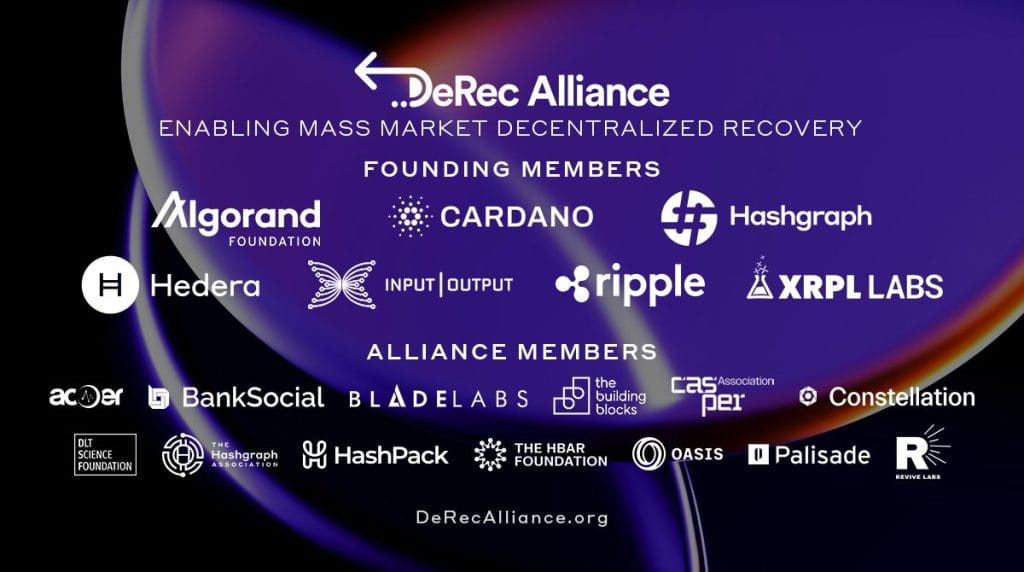They join Algorand Foundation, Hashgraph, Ripple, and XRPL Labs.

The Decentralized Recovery (DeRec) Alliance Research has welcomed its final Founding Members: research and engineering company and Cardano developer Input|Output, as well as the open-source, proof-of-stake network Hedera.
With this move, they have joined Algorand Foundation, Hashgraph (formerly Swirlds Labs), Ripple, and XRPL Labs.
Founding Members’ role is leadership in oversight and governance.
The companies get two-year seats on the Technical Oversight Committee (TOC).
With their TOC membership, Input | Output and Hedera will provide “critical input” on the Alliance’s governance structure and core policies.
This is necessary for the Alliance to maintain its strategic focus and to address the needs of its growing community, the announcement said.

The new members’ “combined expertise and insight will be a great asset to the Alliance,” said Hedera co-founder Leemon Baird. “It’s exciting to see the industry collaborating across so many ecosystems to provide the decentralized recovery that the world so desperately needs.”
Alliance Expands With New Members
In addition to the above-mentioned companies, the DLT Science Foundation, Hashpack, Oasis Protocol Foundation, and Palisade have joined as Alliance Members.
Their role is to advance the DeRec Alliance’s mission of “creating an interoperability recovery standard to facilitate the widespread adoption of crypto and other assets.”
The members provide policy input and oversee the development of DeRec-based solutions, thus shaping the Alliance’s direction.
Moreover, Alliance Members attend quarterly meetings, nominate candidates for TOC, and vote in elections.
Per the press release, their importance extends beyond that.
“They represent a diverse range of organizations that adopt DeRec Alliance standards and best practices, facilitating decentralized recovery and ensuring its accessibility to a broad user base,” it said.
Welcome to the @DeRecAlliance!
— Leemon Baird (@leemonbaird) May 9, 2024
It's so great to see the #web3 industry working together to give users the decentralized recovery safety net that they need – accelerating the global adoption of #DLT. https://t.co/Xdpb80MGmq
The DeRec Alliance was launched in January 2024 by Hedera’s Leemon Baird, as well as leaders from the Hedera and Algorand ecosystems.
They aim to introduce a new open-source, standardized protocol that simplifies and secures digital asset recovery, thus creating a user-friendly and accessible user experience (UX) and advancing Web3 adoption.
The alliance claims that the protocol “absolves users of the risks associated with self-sovereignty” and often complex processes of keeping their keys, passwords, accounts, and funds safe.
Instead, DeRec’s solutions protect all this data, said the announcement.
Paolo Tasca, Founder and Chairman at the DLT Science Foundation, explained that his team co-developed the “secret-sharing protocol with trusted helpers,” which eliminates single points of failures and which DeRec uses to ensure secure and reliable recovery.
Therefore, HashPack CEO May Chan noted DeRec’s potential to solve many account-related issues users face.
Web3 for All
According to John Woods, CTO of the Algorand Foundation, Web3 “has fallen short in delivering a great UX for securing and recovering key material.”
Therefore, the foundation co-founded the DeRec Alliance with the goal to improve the UX for the entire ecosystem, be it regular users, developers, or anyone else.
Along with streamlining key recovery, further decentralization of other important infrastructures is vital, said Woods.
Hedera President Charles Adkins added that DeRec Alliance’s open-source protocol that simplifies asset recovery aligns “closely with our mission to enable a new era of trust and transparency.”
🎓 This week, we hosted the @DLT_Science #Capstone Project Showcase at @ucl, where Postgraduate students from various MSc programmes presented their #research in emerging technologies and #finance, focusing on #DLT and its applications, developed with the guidance of @PaoloTasca…
— DLT Science Foundation (@DLT_Science) August 23, 2024
This is the road to Web3 adoption, the members argue.
Charles Hoskinson, Cardano founder and Input | Output CEO, commented that, as “an industry seeking to drive wider adoption, we should all be committed to the relentless pursuit of security, accessibility, and improving the user experience.”
For the industry to achieve true adoption, argued Jernej Kos, Director of Oasis Protocol Foundation, dapps must match Web2 counterparts when it comes to flexibility, confidentiality, performance, and UX.
Therefore, the members’ unified mission is to remove the “long-standing friction point” regarding private key management, hence making Web3 accessible to all.
Tom Kiddle, co-founder at Palisade, argued that Web3 future hinges on providing users with reliable and secure mechanisms for key recovery.
By contributing their own expertise in private key management and wallet infrastructure, “we are helping to prepare Web3 for mass adoption,” said Kiddle.















Leave a Reply